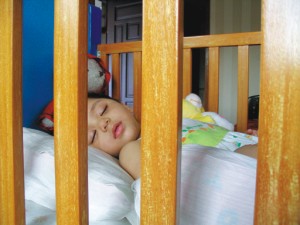Snoozfest
 It is a stiflingly hot afternoon, and you have just come in from the outdoors, having completed what seemed like an eternity of errands. The streets are half empty with only a handful of diligent travellers and rickshaw pullers braving the scorching sun overhead, warm enough to melt the tar on the road. As you gulp down a cold drink, a peek of the bed through your half-open bedroom door begins to look soft, comfy and inviting, compelling your eyelids to grow heavier by the second.
It is a stiflingly hot afternoon, and you have just come in from the outdoors, having completed what seemed like an eternity of errands. The streets are half empty with only a handful of diligent travellers and rickshaw pullers braving the scorching sun overhead, warm enough to melt the tar on the road. As you gulp down a cold drink, a peek of the bed through your half-open bedroom door begins to look soft, comfy and inviting, compelling your eyelids to grow heavier by the second.
How wonderful it would be, you think, if you could slip into the sheets and take a short nap, but you decide to stifle that yawn. If you doze off now, how on earth will you be able to go to sleep at night? Besides, someone had said the other day how napping in the afternoon makes you gain weight. And so, you decide against your siesta; sleeping after all is for lazy bones, you think. You had packed in five hours of snooze time the previous night, which should be enough to pull you through the day. Unfortunately, your body will begin to fight you every step of the way as your limbs start to feel like Jell-O and your temple begins to throb. What you don't realise is that your brain and your body are screaming for a time out.
Siestas -- that wonderfully short 'n sweet, luxurious nap you like to indulge in during sweltering, lazy afternoons are not only enjoyed by Italians and Mexicans alone, but most Bangalees as well. If you are one of those who love your noontime beauty sleep, yet are inflicted with pangs of guilt at having done something so 'unproductive' as napping in the afternoon, relax. Your so-called 'wasteful indulgence' is not a sign, as many are inclined to believe, of laziness and a lack of drive. We tend to think of those who sleep more as un-ambitious and unmotivated. However, science now paints an entirely different picture.
 Sleep, and this includes those 'sinful' siestas, is a necessity for a long and healthy life. A good night-time snooze -- a wide range of studies confirms -- is not all that your system requires. You actually benefit as much from an afternoon snooze. The tendency for many to doze off in the middle of the day is a normal phenomenon, and not quite induced by heavy meals or tropical climes. Scientists declare it to be a part of the natural sleep cycle. A siesta not only feels refreshing, but also has biological benefits, such as improved alertness and mental performance, and a noontime catnap may well improve your demonstrative skills, and enable you to perform better at work. (It is worth mentioning here that the amount of sleep required varies from person to person. For some, it is inclusive of afternoon naps while for others, 7-8 hours of sleep -- or less -- at night suffice.) The proper amount of sleep even aids in concretising practical skills such as playing a sport or performing on a musical instrument. Therefore, what we deem as a bad habit in actuality makes us more intellectually able, not to mention healthier. These benefits naturally include those school-going children, who, with enough sleep are able to perform better in and outside of the classroom.
Sleep, and this includes those 'sinful' siestas, is a necessity for a long and healthy life. A good night-time snooze -- a wide range of studies confirms -- is not all that your system requires. You actually benefit as much from an afternoon snooze. The tendency for many to doze off in the middle of the day is a normal phenomenon, and not quite induced by heavy meals or tropical climes. Scientists declare it to be a part of the natural sleep cycle. A siesta not only feels refreshing, but also has biological benefits, such as improved alertness and mental performance, and a noontime catnap may well improve your demonstrative skills, and enable you to perform better at work. (It is worth mentioning here that the amount of sleep required varies from person to person. For some, it is inclusive of afternoon naps while for others, 7-8 hours of sleep -- or less -- at night suffice.) The proper amount of sleep even aids in concretising practical skills such as playing a sport or performing on a musical instrument. Therefore, what we deem as a bad habit in actuality makes us more intellectually able, not to mention healthier. These benefits naturally include those school-going children, who, with enough sleep are able to perform better in and outside of the classroom.
So what happens if you pack in a sparse number of hours at night, and ignore the siesta altogether? Answer: your biological clock suffers a great deal. Sleep, believe it or not, is just as important as following a proper diet and exercise routine, so don't be surprised if short changing your rest harms your health. Why do you feel sluggish after lunch or feel out of sorts, even sick as the evening draws near? That is because your brain and your body have not had time to recuperate, and you've more or less played havoc with your snooze regime. Inadequate sleep makes people more prone to disease, because our hormonal and metabolic systems suffer a set back, thereby producing fewer anti-bodies that aid in fighting infection. A disruption of the normal sleep cycle leads to outward effects such as fatigue, trouble concentrating, and make one irritable, which are warning signs that your system has gone into disarray.
 At the same time, oversleeping should be avoided at all costs as it tends to reset your natural sleep/wake cycle clock, which in turn makes subsequent sleeping attempts more difficult.
At the same time, oversleeping should be avoided at all costs as it tends to reset your natural sleep/wake cycle clock, which in turn makes subsequent sleeping attempts more difficult.
Our hectic, over-worked present day lives can be the source of much stress and anxiety, which in turn robs us of the proper amount of rest that we require. However, there are ways by which one can combat such factors, and so, here are a few helpful tips one can live by:
*Avoid caffeine.
* Avoid heavy meals right before sleep. Eat your dinner at least a couple of hours before bedtime.
* Sleep on a good, firm mattress.
* Keep regular bed time hours -- a certain time that you go to bed and a certain time you wake up.
* If you take a nap, don't oversleep.
* Avoid watching TV or reading before going to bed.
*Practice deep breathing.
Sleep is a necessary part of life. It is a part of the natural order and must not be tampered with at any cost; otherwise you will be putting your health at risk. This certainly includes catnaps, siestas and the like. So next time you plan to burn the midnight oil or skip that afternoon siesta, think twice!
By Rubaiyat Khan
Photo: Zahedul I Khan
Models:Ariana Mahboob & Linia
Insomnia:
Insomnia is a sleep disorder whereupon people feel that they are not getting enough sleep. You may have the disease if you are experiencing the following symptoms:
- Difficulty falling asleep
Waking up during the night and having trouble going back to sleep
Waking up too early in the morning
Disturbed sleep
There are two types of Insomnia
A person may be inflicted with primary or secondary insomnia. Then former means that a person is having sleep problems, which are not directly related to any other health condition, or problem. Secondary insomnia means a person is having sleep problems due to a health condition (such as arthritis, depression, heartburn, asthma, etc) This disease may last for a short period of time, or last for a while. It may also come intermittently, with periods of time when a person  has no difficulty with sleep. Short-term insomnia may be caused by physical or emotional discomfort. Causes of this kind of insomnia may include:
has no difficulty with sleep. Short-term insomnia may be caused by physical or emotional discomfort. Causes of this kind of insomnia may include:
- Illness
- Major stresses in one's life, including significant changes (death of a loved one, job loss or change, etc)
Environmental factors like light, noise or extreme temperatures that interfere with sleep.
Dreams:
The physiological study of dreams started in the 1950's. It was found that physiologically, sleep  is a condition of a chemical regeneration of the brain. REM sleep was then associated with vivid dreaming. In recent years, some research indicates that dreams are mere by-products of the work brain cells do during sleep to dump unnecessary memories from the brain. Some current dream related research reveals that one's learning ability (particularly to solve mathematical problems) are linked to REM sleep. It has been found that prolonged REM sleep deprivation (and hence dream deprivation) can lead to various psychological problems.
is a condition of a chemical regeneration of the brain. REM sleep was then associated with vivid dreaming. In recent years, some research indicates that dreams are mere by-products of the work brain cells do during sleep to dump unnecessary memories from the brain. Some current dream related research reveals that one's learning ability (particularly to solve mathematical problems) are linked to REM sleep. It has been found that prolonged REM sleep deprivation (and hence dream deprivation) can lead to various psychological problems.
Nightmares:
People usually have nightmares towards the later part of the night when REM sleep predominates. After awakening from a nightmare, people usually regain alertness almost readily and remember the dream content quite vividly. Usually the content poses a threat to the person's survival, security or self-esteem. Nightmares also correlate to the stresses of life. In psychotherapy, recurring nightmares with the same content is an indication that an issue that has been neglected at a conscious level is popping up from the unconscious to demand attention. Symbolic meanings are often interpreted to find a connection to the unconscious issue. The brain chemical Serotonin is closely linked to sleep. An optimum amount of the amino acid Tryptophan (a precursor of Serotonin) containing food about an hour before sleep can help promote and stabilise sleep. Foods like yoghurt, cottage cheese, banana, tuna etc contain a good amount of Tryptophan. However, an excessive amount of Tryptophan containing food has been found to be associated with nightmares as well. Post traumatic stress disorder, anxiety disorder, substance use disorder and psychotropic medications are common causes of nightmares.
By Dr. Nighat Ara

